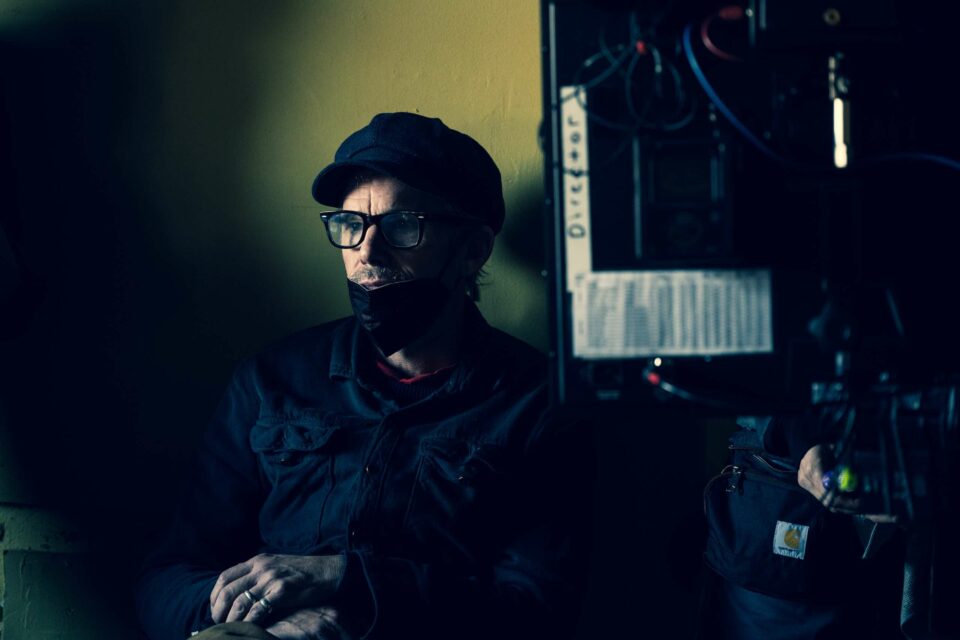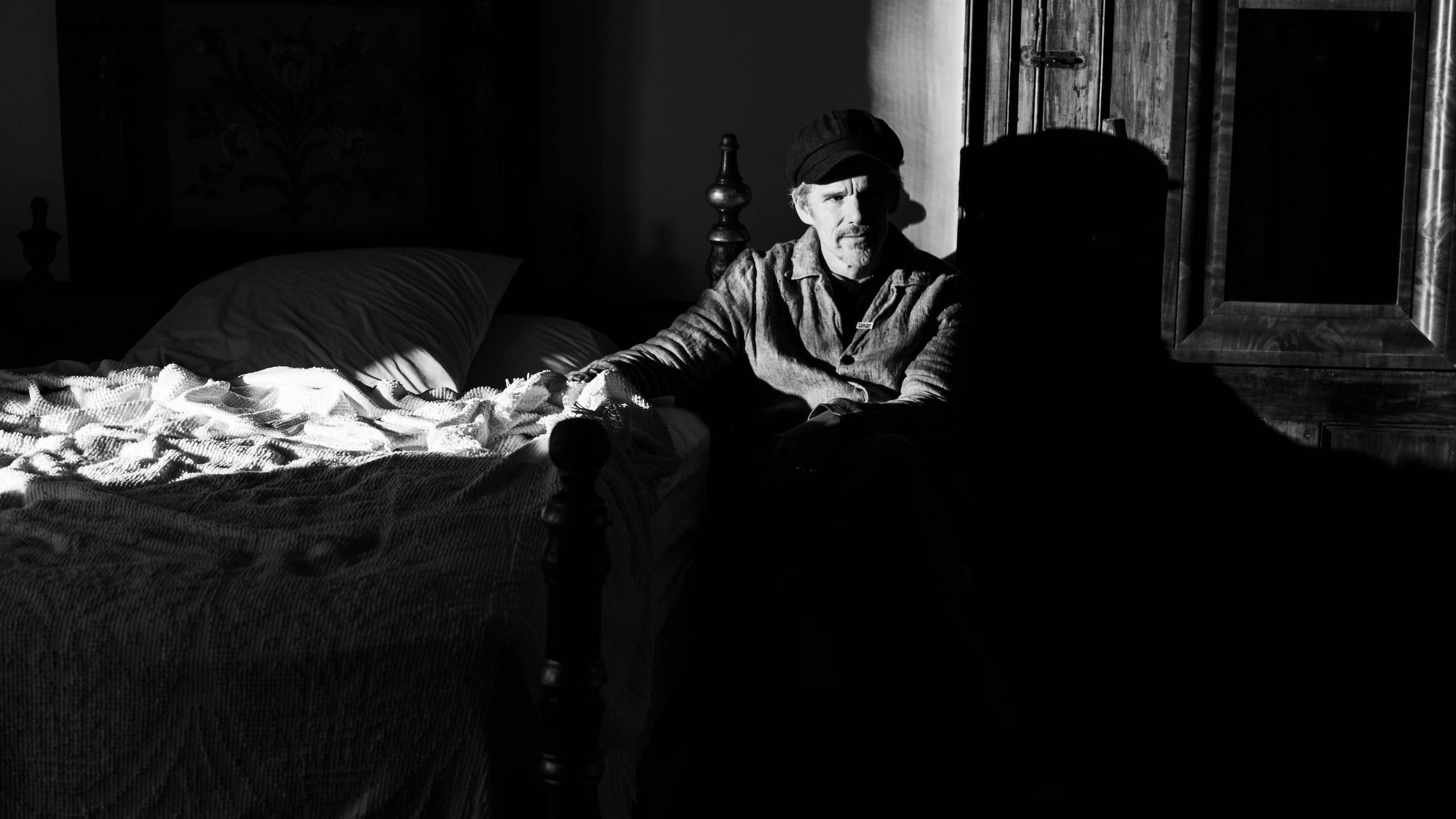It’s difficult to pick Ethan Hawke’s greatest performance. Training Day versus Before Sunrise, Gattaca versus The Purge—the list could go on and on. For those of us under the age of 35, he’s been a consistent force throughout our lives, one of the few actors we’ve seen age from a teenager to a leading man to a father of three. During that time, he’s been evolving as well, writing fiction (-ish) books, directing documentaries, and living under a constant spotlight.
In fact the 53-year-old Austin-born actor has spent the majority of his life in front of an audience, regardless of how big that audience might be. “Sometimes I felt like my life as a performer was just as real as my real life. It’s really confusing,” he tells me, gesturing in every direction with his hands. He’s often looking around as he speaks, constantly thinking, taking long moments before continuing. It’s both hurried and slow. Behind him hangs a framed movie poster of Paul Newman, the subject of Hawke’s recent HBO docuseries The Last Movie Stars. “I find an old jacket I wore in an old play and it’s as real to me as the jacket I wore in high school. It represents an aspect of me that’s gone, that I can touch.”
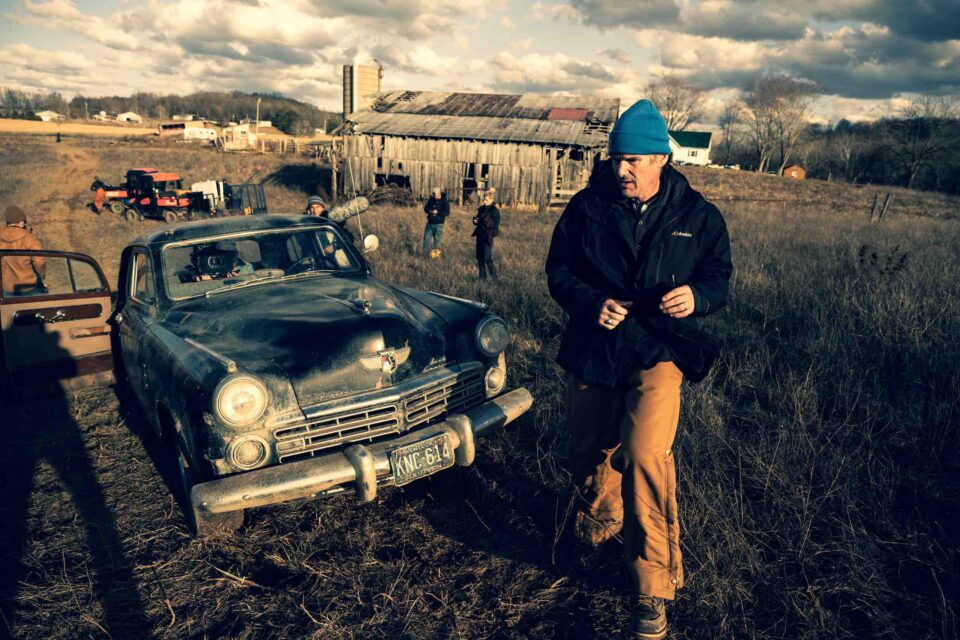
The actor seems to question the reality of any situation. He doesn’t care for artificiality. He tries to be genuine by continually focusing on the simple act of doing what he loves: acting. “The same thing can be used for you and I in this conversation: Are we being real with each other? And what does being ‘real’ mean? A lack of pretense, right? Authenticity. These kinds of words get thrown around, but I find if you’re sincerely doing something you love, good things happen.”
Hawke’s newest project, Wildcat, a biopic on Southern Gothic writer Flannery O’Connor, marks his fifth feature-film directorial effort and his first with his daughter, Maya Hawke. To him, though, this idea started with her. “An artist I really respect had a burning desire to play this character,” Hawke says. “My daughter grew up seeing so many movies about complicated men and their relationship to themselves in their work. Good or bad, that journey had value, and she wanted to see a movie with a young woman that was like that.”
Wildcat follows O’Connor as the writer returns home in an attempt to finish her novel after being diagnosed with lupus. Hawke frames the film through her short stories, using them as asides to show O’Connor’s dark wit and creativity, along with her ability to see life in the South through a hyperspecific lens. He draws out a layered lead performance from Maya, who’s seen recent success in supporting roles in Asteroid City and Maestro. It’s another entry in her father’s fascination with process in all artistic pursuits, and, as his subject struggles with her Catholicism, his interest in all things religious.
“I find an old jacket I wore in an old play and it’s as real to me as the jacket I wore in high school. It represents an aspect of me that’s gone, that I can touch.”
Hawke knows that not everyone will respond positively to the father/daughter filmmaking duo. “The bad version of it is, you know, ‘Hey, I’m making a movie with my daughter, isn’t that cute?’ It’s cute to about five people and they all live in this house. And to everybody else, it’s suspect.” And so, he worked with more precision, emulating O’Connor’s discipline. He mentions that she worked with a scalpel, and he tried to rewire his brain to do the same.
In the past decade, Hawke has focused on singular creative visionaries, those that have been forgotten—or simply those that he wants us to remember more often. “The problem, and the lies, of movies and things like that are that they frame a human being in one aspect,” Hawke explains. “It’s so funny that I’ve done so many biographies, from Blaze to Wildcat, The Last Movie Stars to Seymour. If you were to ask me, I would say I don’t like that medium, because of how much it limits these people. But I think that if I do it well, it’s because I don’t like it. I resist it, I fight it the whole time.”
His most recent novel, A Bright Ray of Darkness, details an early-thirties actor performing as Hotspur in Henry IV on Broadway while he goes through a cheating scandal and a public divorce. Hawke performed that role 20 years ago, in 2003, very soon after separating from Uma Thurman amid allegations of infidelity. This combination of Hawke’s personal and professional life transforms the work. He melds the two realities, much like his latest film subject. “I find my life working best when there’s some kind of integration between my work and my development as a person,” Hawke says. “If I see people holding back, I smell it. What are you holding back? What’s behind that curtain?”
For him, the idea of holding oneself back from a project doesn’t hold merit. He’s never had that thought before. It’s widely understood that Hawke’s and Julie Delpy’s characters in the Before trilogy—which the acting pair rewrote their dialogue for based on a script by Kim Krizan and director Richard Linklater—became mirrors of the two actors, with each incorporating their own lives into the films. “You have to make it personal without making it about you. But it can’t be a journal, I can’t be navel gazing. Like ‘I felt sad on Tuesday,’” he laughs. “You’re taking the reader on a journey and you’re bringing them with you.”
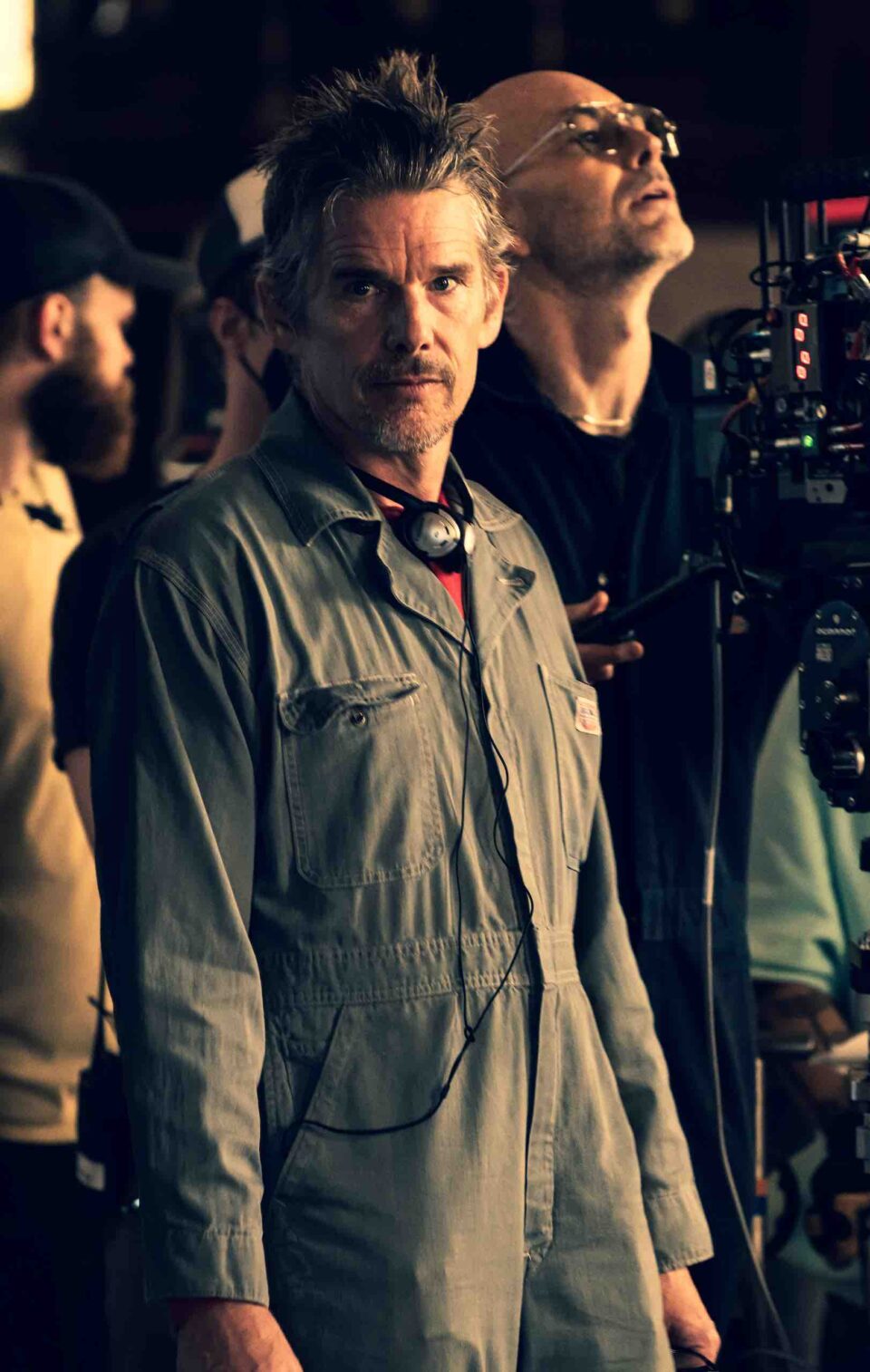
“You have to make it personal without making it about you... You’re taking the reader on a journey and you’re bringing them with you.”
He knows he’s not writing about anything new, but he doesn’t care. He’s imbuing himself into these novels, creating an individualization within recurring threads of time, love, and art. He thinks that stories are cyclical, and I tend to agree. We’re often concerned with the same issues, battling the same problems in different forms. “Each generation is working through the same themes: getting along with our parents, how can society work better, fairness, equality,” he says. “Falling in love, death—all these themes are consistent throughout time. So you just have to write about them in an original way. And the only way to do that is to be yourself, right? The thing you have to do to be original is be yourself, and that’s pretty hard to do.”
Throughout our conversation, Hawke can’t stop referencing filmmakers, authors, actors, and philosophers. I would’ve expected nothing less from someone who’s ceaselessly voiced his love of art. He references shots in Game of Thrones, and how they’re stolen from a foundation of film and television that came before it, even though he makes it clear that he likes the show. He just wants the audience to be aware of the history of art, making current film and TV even richer.
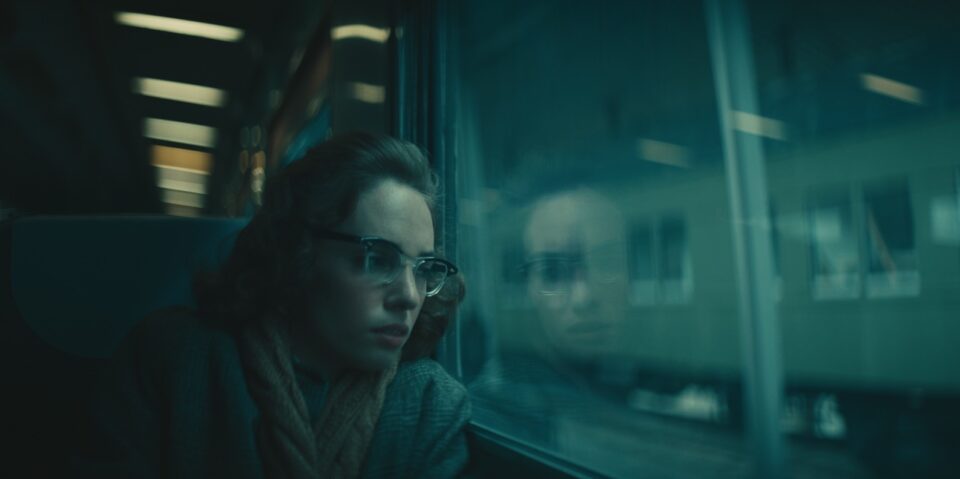
As he ages, Hawke’s legacy continues to be built around him, even as he attempts to crystallize others’ legacies with these biographies. Still, legacies are often built by others—it’s one of O’Connor’s concerns in Wildcat. But Hawke seems unconcerned by it. “There’s a line in the movie where Liam Neeson says that ‘It’s all straw.’ We’re all, to larger and smaller extents, building sandcastles,” he claims. “The thing that’s most important is how we spend our time with ourselves and how we spend our time with others. Things like legacy are probably artifice, that each generation is going to keep revising itself. Even Beethoven or William Shakespeare—those sandcastles will fall. Not that many people are poring over Sophocles anymore,” he takes a big laugh.
“My daughter grew up seeing so many movies about complicated men and their relationship to themselves in their work... She wanted to see a movie with a young woman that was like that.”
“What I like about that is it takes the pressure off,” he continues, mentioning Toni Morrison’s memorial, his interest in Faulkner and Fitzgerald as a kid, and all of these literary figures’ relationships to time. “I love looking at the ocean. When you look at the ocean or the stars, you think it would make you feel diminished, when you take in the grandness of time. Instead, there’s something relaxing about it, inside the humility of it all, that the world’s really not on your shoulders. And yet, you’re a part of something. I find that really beautiful. Obviously, it’s a pretty cliché thing I’m saying, but I don’t think legacy matters to us.”
Hawke’s latest involves jabs at the cyclical nature of politics and racism as well. “It’s not new information,” he says. “We act like it’s new information. If you have some awareness of what’s been said before, you have the opportunity to build on it. What’s the story of America?” he asks. “Do you include the casual racism of the Jim Crow South and good people like Flannery O’Connor, who participated and benefited from it? Or do we not tell their story? Because we don’t want to look at that, because we find it so ugly. Yet we’re still benefiting from it. We’re still there.”
When asked why Flannery O’Connor and why now, Hawke has a simple, yet meaningful explanation that shows how much he’s aged from the teenager in Dead Poets Society. “It sometimes felt like this movie happened to me. My daughter comes into this house, and she goes ‘I think I can do that.’ And I didn’t look back.” FL
